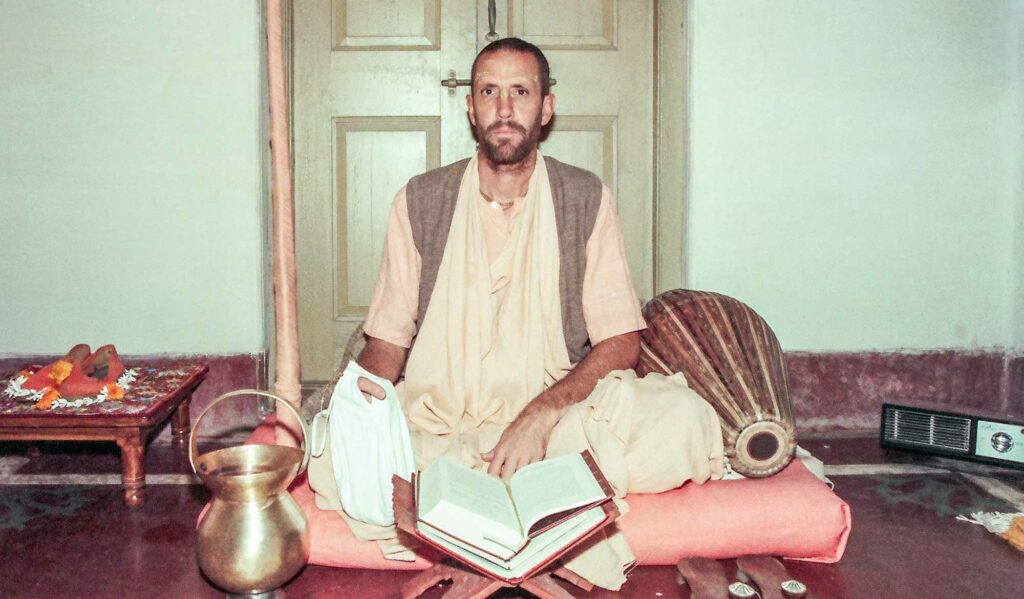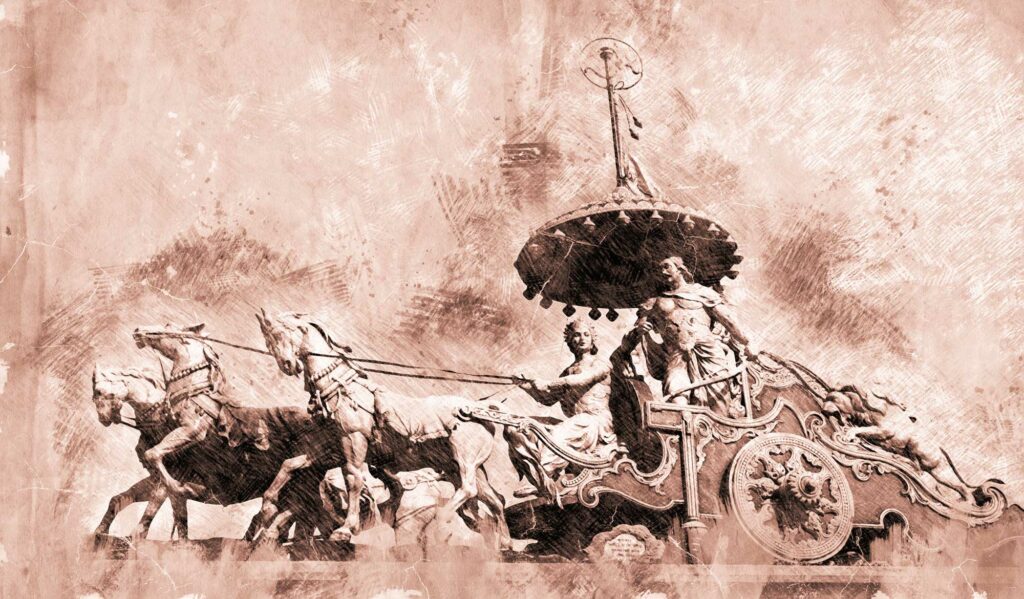Overview
The following is an informal discussion on September 29th 2022 between devotees of the Rūpānuga Bhajana Āśrama, Vṛndāvana, on the appearance day of Śrīpāda Araṇya Mahārāja. Araṇya Mahārāja shows his gratitude to Śrīla Narasiṅgha Mahārāja and his gurus, and discusses our vision of guru-tattva and how it is our duty to instill faith and hope in others.
Śrīpāda Araṇya Mahārāja’s Reflections
Śrīpāda Araṇya Mahārāja: Kṛṣṇa works in mysterious ways. Narasiṅgha Mahārāja and all of you have saved me from the clutches of that desert on the ‘other side of the river’, so to say, and given me more affirmative action, affirmative conviction to act in this way. We were confined there. We weren’t able to express our feelings for the relationship that Śrīla Prabhupāda had with Śrīla Śrīdhara Mahārāja, that Śrīla Śrīdhara Mahārāja had with Śrīla Prabhupāda and Śrīla Bhakti Pramoda Purī Mahārāja also. All of these factors were suppressed in that environment. So when Narasiṅgha Mahārāja came, he was like a breath of fresh air. Really, he was somebody that I could connect with who had the same viewpoint and the same experiences in their devotional career in this lifetime. However, destiny arranged it that he departed prematurely. Kṛṣṇa wanted him and that’s His prerogative also to do with us as He pleases.
When I understood what Narasiṅgha Mahārāja’s desire was, I didn’t have any qualms about actually supporting that desire because I felt, “He is the guru, he knows what is the situation” and I tried to harmonise things as best I could. But undoubtedly it became more and more apparent as it went on that there was some self-interest from certain parties and a great injustice was being committed. To see that good devotees who had undoubtedly rendered service to their guru for five, ten, fifteen, twenty years and it was going to go to waste — this was intolerable. It is like Śrīla Śrīdhara Mahārāja said, “So many have come to the feet of Mahāprabhu and they are going away?” He could not tolerate that. Therefore he took a stand even when it went against the so-called majority. We’re not interested in the mob rule.
We saw that Sarasvatī Ṭhākura saw in Śrīla Śrīdhara Mahārāja a person who was going to carry on his message, what he had come to give, what Rūpa and Sanātana had come to give and what Mahāprabhu had come to give. I felt the same feeling about Narasiṅgha Mahārāja in regards to all of you and it has come to pass that this group that he trained is carrying his message — if I can be part of what he wanted to bring to the Vaiṣṇava world, then I feel very honoured. I am wearing this sannyāsa dress, which represents a very high ideal, only because of Narasiṅgha Mahārāja and because of you all.
Association With Śrī Guru Comes in Many Forms
To harmonise a plurality of gurus takes a particular type of training, and Narasiṅgha Mahārāja introduced that. On which altar in the world are there three gurus who are contemporaries? We could add a whole list of others who have helped us in our spiritual life, but these are the prominent ones. Nayanānanda Dāsa Bābājī is represented by our Deity of Gaura-Govinda.* When he gave this Deity then I understood that Śrīla Śrīdhara Mahārāja was still encouraging us. In the same way, I feel that through you all he is encouraging. And I think that this is what association is all about. If we want to start looking at the faults in each other, there’s no end to that. But if we want to look at the positive side, there’s no end to that either.
* Editor: Śrīla Nayanānanda Dāsa Bābājī Mahārāja (Śrīpāda Satprasāṅgānanda Prabhu) was a disciple of Śrīla Sarasvatī Ṭhākura and a close associate of Śrīla Śrīdhara Mahārāja and Śrīla Purī Mahārāja. He accepted bābājī-veśa from Śrīla Purī Mahārāja.
Gaura Gopāla Dāsa: It has become clear through your association that different aspects of the guru can be brought out through different types of association. We see that in our vision of personalities like Śrīla Prabhupāda, Śrīla Śrīdhara Mahārāja and even our own Guru Mahārāja, we may have our own particular relationship with all these personalities, but that’s all through the eyes of our guru. But then coming in touch with you, a different aspect comes to life – a different aspect of someone like Śrīla Śrīdhara Mahārāja comes to life. Through this whole situation then that’s brought to life the mood of Śrīla Śrīdhara Mahārāja that’s come through you – of seeing the positive aspect in devotees, trying to bring that out and trying to encourage that, rather than to dismiss and to demonise.
Śrīpāda Araṇya Mahārāja: Yes, to discourage people is very easy. Prabhupāda came to take the faithless and instill faith within them – to instill hope and prospect within the hopeless. “Don’t stay here rotting in this material world.” We want to help others and with a sense of trying to do that, we should arm ourself with all the different aspects of devotional service that we can, because everybody is different and different aspects of divinity will appeal to different personalities. We have to be able to see what will appeal to different persons without diminishing or watering down the process, and at the same time bring them to the highest prospect.
Why did Rādhārāṇī leave Kurukṣetra? Because Kṛṣṇa had instilled within Her that He would never leave Her, that He will come back and see Her in Vṛndāvana. And with that confidence She left and came back to Vṛndāvana thinking that, ‘Kṛṣṇa is mine.’ So they are giving us that hope. They are connecting us with the Person who has the highest feeling towards Kṛṣṇa. That is Śrīmatī Rādhārāṇī — we are in Her line. That is inconceivable in many ways. Your Guru Mahārāja was able to capture that, so how can we drive those people away who came to him for that? If they are sincere, that sincerity will manifest. But if we’re covered with pride, and arrogance, we won’t be able to catch these finer points — they’ll be concealed from us. And if these are genuine sentiments, our relationship will never break. That is the point.
Become an Agent
When we sacrifice for others we should not expect anything in return. But those who have been sacrificed for, there should be some feeling, and that interchange of feelings is Vṛndāvana. That is the mood of Vṛndāvana. Because what are those feelings for? For service to the Centre, to please our Guardians. We offer everything first to our gurus, and they offer it to their gurus. It goes up, and then it comes back down as prasādam.
I do not feel very worthy actually, but what they want to do with us, we can only pray, “You do with me what You want and use me.” If they want to use me for some particular purpose that they have in mind then they can do that. I feel that you have all been given a particular service by Narasiṅgha Mahārāja to bring out these great treasures to the world that have come down and been given to us specifically by Bhaktivinoda Ṭhākura — he is the founder of the Kṛṣṇa consciousness movement in the western world. All his inspiration came through him to Sarasvatī Ṭhākura and then to Śrīla Śrīdhara Mahārāja, Śrīla Prabhupāda, Pramoda Purī Mahārāja, Nayanānanda Dāsa Bābājī etc. All these personalities were inspired by Bhaktivinoda Ṭhākura — he was the one who brought it all together and focused, “This is it. This is where we are going. This is where you want to be.” We should try to be an agent for those who are attracted to that. We should be directing everybody who comes in our connection to that. They may not always be inspired for that, but that’s fine. That is the free flow of Divinity. We should act in such a way so that we don’t get entangled in all the unnecessary institutional quagmires that will present themselves.
Things will come our way and as I warned one friend recently, “The money that is coming from the west is dripping with the blood of the cow and the bull. It is not so easy to digest this energy, so you must be very careful.” Because, in my view, people he has been associated with have been contaminated by that energy. We want to make sure that we don’t fall victim to that also. Whatever does come from any side is all tainted with some kind of pāpa. We have to be able to digest it properly, which means utilising it properly. Narasiṅgha Mahārāja set the example — as soon as money came he spent it. It was gone. That is what we should be doing with whatever comes our way. If someone comes tomorrow and gives us ten million it should be gone the next day. Not that we just hold on to it in the bank. No! There’s a lot of things that want to use us for certain things. The main thing is, “O Lord, please protect us from the influence of this material energy.Please protect me from myself.”
Gaura Gopāla Dāsa: One thing I would add is that some time ago one of our contemporaries, in a rare moment of candidness and truthfulness said, “Prema Kiśora Prabhu (Śrīpāda Āraṇya Mahārāja) is our Śrīdhara Mahārāja.” For once I would have to agree with him because just as Śrīla Śrīdhara Mahārāja came at a particular time of necessity, you also came at a time of necessity. So we feel that Śrīla Śrīdhara Mahārāja sent you to do that relief work for us.
Śrīpāda Araṇya Mahārāja: And also Śrīla Prabhupāda. You can’t separate the two of them. Prabhupāda directed us to Śrīla Śrīdhara Mahārāja, and Śrīla Śrīdhara Mahārāja redirected us back to Śrīla Prabhupāda – he directed us to understand who he was and what he actually gave to the world. We might have thought certain things, but we didn’t understand. It takes somebody who has such a depth of vision to be able to understand what he really came to give. It is just amazing what Prabhupāda presented to the world! And it was Śrīla Śrīdhara Mahārāja who reinforced that. So those who abandoned Śrīla Prabhupāda for Śrīla Śrīdhara Mahārāja made a major mistake! And those who abandoned Śrīla Śrīdhara Mahārāja thinking that was Prabhupāda’s desire also made a major mistake! Two wrongs don’t make a right!
Gaura Gopāla Dāsa: When you have had contact with a bona-fide guru, sometimes you may think, “I don’t see anybody else out there. It looks like a desert.” But you really don’t know who is out there. It’s not that you need to go searching here and there, listening to just anyone and everyone, but when the time is right somebody will be revealed. When the necessity is there, the reserves are there. When the time is right, then someone will be there always.
Śrīpāda Araṇya Mahārāja: Necessity is the mother of invention.
Related Articles
- The True Spirit of Separation by Śrīla Bhakti Pramoda Purī Gosvāmī
- Śrīla Swami Mahārāja Attains the Dust of Vraja by Śrīla Bhakti Pramoda Purī Gosvāmī
- The Disappearance of Śrīla Śrīdhara Mahārāja by Śrīla Bhakti Pramoda Purī Gosvāmī
- Who is Qualified to Succeed the Ācārya? by Śrīla Bhakti Rakṣaka Śrīdhara Deva Gosvāmī
- Śrīla Sarasvatī Ṭhākura’s Disappearance Day by Śrīla Bhakti Rakṣaka Śrīdhara Deva Gosvāmī
- His Last Instructions by Śrīla Bhakti Gaurava Narasiṅgha Mahārāja
- The Prākṛta and Aprākṛta-līlā of Śrī Guru by Śrīla Bhakti Gaurava Narasiṅgha Mahārāja
- Śrīla Prabhupāda’s Antya-līlā by Śrīla Bhakti Gaurava Narasiṅgha Mahārāja
- Śrīla Sarasvatī Ṭhākura’s Disappearance Day by Śrīla Bhakti Gaurava Narasiṅgha Mahārāja
- Śrī Jagannātha Deva Shook the Heaven and the Earth by Śrīla Bhakti Gaurava Narasiṅgha Mahārāja
- After the Disappearance of Śrī Guru by Śrīla Bhakti Gaurava Narasiṅgha Mahārāja
- A Nourishing and Compassionate Nature by Śrīla Bhakti Kiśora Āraṇya Mahārāja
- The Compassionate Nature of Śrī Guru by Śrīla Bhakti Kiśora Āraṇya Mahārāja
- Hope For The Hopeless by Śrīla Bhakti Kiśora Āraṇya Mahārāja
- The Disappearance of Śrīla Bhakti Gaurava Narasiṅgha Mahārāja by Swami B.V. Giri
Further Reading
Prema Dhāma Deva Stotram with the Narasiṅgha Sevaka Commentary – Verses 61-65
In verses 61 to 65 of 'Prema Dhāma Deva Stotram', Śrīla Śrīdhara Mahārāja narrates the pastime of Śrī Caitanya at Caṭaka Parvata In Purī and explains how the scriptures produced by Brahmā and Śiva are ultimately searching for the personality of Mahāprabhu who is merciful too all jīvas, no matter what their social position.
Prabhupāda Śrīla Sarasvatī Ṭhākura’s Visit to Ayodhyā
With the forthcoming observance of Śrī Rāma Navamī, we present 'Prabhupāda Śrīla Sarasvatī Ṭhākura’s Visit to Ayodhyā' written by Śrīla Bhaktisiddhānta Sarasvatī Ṭhākura Prabhupāda from The Gaudīyā magazine, Vol 3. Issue 21/ In December 1924, after visiting Benares and Prāyāga, Sarasvatī Ṭhākura visited the birth-site of Śrī Rāmācandra in Ayodhyā.
Śaraṇāgati – The Only Path to Auspiciousness
In this article, 'Śaraṇāgati - The Only Path to Auspiciousness', Dhīra Lalitā Dāsī analyses the process of śaraṇāgati (surrender) beginning with śraddhā (faith). She also discusses the role of śāstra and the Vaiṣṇava in connection with surrender.
Ātma Samīkṣā – The Value of Introspection
In this article, "Ātma Samīkṣā – The Value of Introspection" Kalki Dāsa highlights the importance of introspection in the life of a devotee and especially in relation to the worldly environment that surrounds us. He also explains how transcendental sound influences our capacity to introspect.
Prema Dhāma Deva Stotram with the Narasiṅgha Sevaka Commentary – Verses 61-65
In verses 61 to 65 of 'Prema Dhāma Deva Stotram', Śrīla Śrīdhara Mahārāja narrates the pastime of Śrī Caitanya at Caṭaka Parvata In Purī and explains how the scriptures produced by Brahmā and Śiva are ultimately searching for the personality of Mahāprabhu who is merciful too all jīvas, no matter what their social position.
Prabhupāda Śrīla Sarasvatī Ṭhākura’s Visit to Ayodhyā
With the forthcoming observance of Śrī Rāma Navamī, we present 'Prabhupāda Śrīla Sarasvatī Ṭhākura’s Visit to Ayodhyā' written by Śrīla Bhaktisiddhānta Sarasvatī Ṭhākura Prabhupāda from The Gaudīyā magazine, Vol 3. Issue 21/ In December 1924, after visiting Benares and Prāyāga, Sarasvatī Ṭhākura visited the birth-site of Śrī Rāmācandra in Ayodhyā.
Śaraṇāgati – The Only Path to Auspiciousness
In this article, 'Śaraṇāgati - The Only Path to Auspiciousness', Dhīra Lalitā Dāsī analyses the process of śaraṇāgati (surrender) beginning with śraddhā (faith). She also discusses the role of śāstra and the Vaiṣṇava in connection with surrender.
Ātma Samīkṣā – The Value of Introspection
In this article, "Ātma Samīkṣā – The Value of Introspection" Kalki Dāsa highlights the importance of introspection in the life of a devotee and especially in relation to the worldly environment that surrounds us. He also explains how transcendental sound influences our capacity to introspect.








